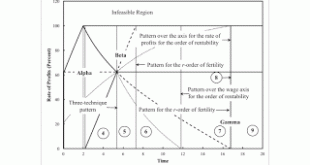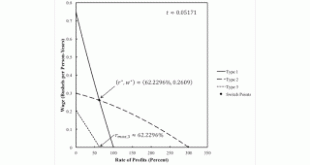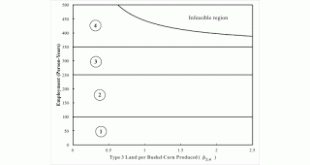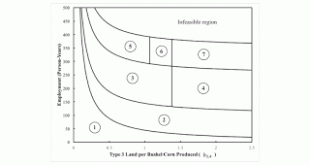"Let us take the process of circulation in a form under which it presents itself as a simple and direct exchange of commodities. This is always the case when two owners of commodities buy from each other, and on the settling day the amounts mutually owing are equal and cancel each other. The money in this case is money of account and serves to express the value of the commodities by their prices, but is not, itself, in the shape of hard cash, confronted with them. So far as regards...
Read More »Structural Dynamics With Extensive Rent
Figure 1: Variation in Switch Points with Time1.0 Introduction This post continues my effort to understand how fluke cases can partition parameter spaces in models of prices of production with extensive rent. Some background for this post is here, here, and here. 2.0 Technology The technology is described by the coefficients of production in Table 1. I assume that requirements for use are such that they cannot be satisfied by cultivating only two types of land. After fully cultivating...
Read More »Background Needed For Debates On The Labor Theory Of Value Versus Marginalism
[embedded content]A Propertarian Getting The Better Of The Wrong Side Of The Argument I have been looking at some debates on YouTube. Not only is there a culture of twitch streamers debating. There are some, such as Noah Cortez "Booksmarts", critiquing debates. By the way, here is a video providing an overview of (Resnick and) Wolff's academic work, seemingly inspired by the prominence Wolff is gaining with his YouTube presence. I suppose that this post is aspirational, and some of these...
Read More »On My Research Program
"I know not how I may seem to the world, but as to myself I seem to have been only like a boy playing on the sea-shore and diverting myself in now and then finding a smoother pebble or a prettier shell than ordinary, whilst the great ocean of truth lay all undiscovered before me." -- Isaac Newton (apocryphal?) For the past couple of years, I have been pursuing a research program that I seem to have stumbled upon. I am looking for fluke switch points, where these fluke switch points...
Read More »Fluke Cases for the Order of Fertility
Figure 1: Wage Curves for Fluke Case for r-Order of Fertility1.0 Introduction This post illustrates two fluke cases that can arise in a model with land and extensive rent. I call these a pattern of switch points for the r-order of fertility and a pattern of switch points for the w- order of fertility. I have previously described a fluke case in the order of rentability, which can be either over the wage axis or over the axis for the rate of profits. These fluke cases can arise in an...
Read More »Engels to Sombart in 1895
This transcription is taken from here. Dear Sir: Replying to your note of the 14th of last month, may I thank you for your kindness in sending me your work on Marx; I had already read it with great interest in the issue of the Archiv which Dr. H. Braun was good enough to send me, and was pleased for once to find such understanding of Capital at a German University. Naturally I can't altogether agree with the wording in which you render Marx’s exposition. Especially the definitions of...
Read More »Flukes In A Modification Of An Example With Land
Figure 1: A Partition of a Slice of the Parameter Space1.0 Introduction This post presents another example from Woods (1990). It is a modification of this example. That previous example demonstrates that the order of fertility - the order in which lands of various types and that support different processes of production are taken into cultivation - varies with distribution. If the wage were different, the order of fertility could be different. Furthermore, the order of rentability - the...
Read More »Does The Existence Of Wine Refute The Labor Theory Of Value?
[embedded content]Victor Magarino Debating "Ubersoy" On The Labor Theory Of Value The above is one in a series (Richard Wolff versus "Destiny", Slavoj Zizek versus Jordan Peterson) in which the pro-capitalist/anti-socialist side is represented by somebody seemingly almost completely ignorant of the topic they are pretending to discuss. Magarino needs a better interlocutor. I can find some related debates on YouTube with a more level playing field. That said, I think Magarino needs a...
Read More »Flukes In An Example With Land
Figure 1: A Partition of a Slice of the Parameter Space1.0 Introduction This post tells a story in which owners of a certain type of land find the amount of their land needed to produce net output declines. Wages stay constant, and the rent for some landlords increases. This example is generalized from Woods (1990). 2.0 Technology This an example (Table 1) of a capitalist economy in which two commodities, iron and corn, are produced. One process is known for producing iron. In the iron...
Read More »Elsewhere
[embedded content]A History Lecture Focusing on Cantor, Dedekind, Gödel, Turing, etc.Norman Wildberger's next video in the above series is here. This professor, who has some dissenting views, explicitly tells his class that he does not belive in any of what he is teaching here. I wish, in trying to introduce this, he was more clear on the distinction between provability and truth. You do not get much even on lives here, much less on what minor events in the world induced Gödel to leave...
Read More » Robert Vienneau: Thoughts Economics
Robert Vienneau: Thoughts Economics




